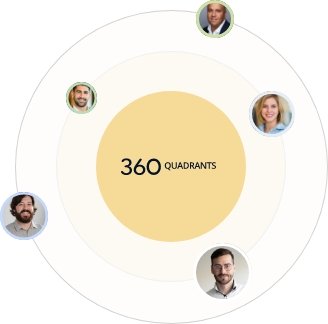Data quality software refer to a wide range of tools and services specifically designed to deliver comprehensive and precise data to organizations. Data quality software vendors offer a broad range of functions and capabilities, which include data cleansing, profiling, parsing, monitoring, and enrichment. The data quality software allow organizations to comprehend, standardize, and monitor the data over the course of its lifecycle, ensuring continuous operation within the system. Ensuring data quality should be a paramount concern to the authorities, as a good dataset within an organization can be a key enabler to gain competitive advantage in the market by conducting better analysis and craft business strategies that will have long-term implication on realizing organizational goals. The 6 key considerations of data quality, which every enterprise should seek for, include consistency, conformity, completeness, uniqueness, accuracy, and integrity of data.
Top 10 Data quality software 2020:
- Informatica Corporation
- Ibm Corporation
- Sap Se
- Sas Institute Inc
- Syncsort
- Talend
- Experian Plc
- Oracle Corporation
- Alteryx Inc
- Microsoft Corporation
The vendors are placed into 4 categories based on their performance in each criterion: “visionary leaders,” “innovators,” “dynamic differentiators,” and “emerging companies.” The top 25 vendors evaluated in the data quality software market include Alteryx, Ataccama, BackOffice Associates, Data Ladder, DQ Global, Experian, IBM, Informatica, Information Builders, Infosolve Technologies, Ixsight Technologies, Innovative Systems, Microsoft, Oracle, QFire Software, Pitney Bowes, Neopost, RedPoint Global, SAS Institute, Syncsort, Trianz, Talend, Tamr, and Uniserv.
Vendors who fall into this category receive high scores for most of the evaluation criteria. They have strong and established product portfolios and a very strong market presence. They provide mature and reputable data integration tools. They also have strong business strategies. The visionary leaders in data quality software include IBM, Informatica, Oracle, SAP, SAS Institute, and Talend.
They are established vendors with very strong business strategies. However, they are low in their product portfolios. They focus on a specific type of technology related to the product. Data quality software vendors who fall in this category are Experian, Information Builders, Microsoft, and Pitney Bowes.
Innovators in the data quality software are the vendors who have demonstrated substantial product innovations as compared to their competitors. They have very focused product portfolios. However, they do not have very strong growth strategies for their overall businesses. Vendors who fall in this category are Alteryx, Ataccama, BackOffice Associates, Data Ladder, Innovative Systems, QFire Software, Syncsort, Tamr, and Trianz.
These are vendors with niche product offerings who are starting to gain their positions in the data quality tools market. They do not have very strong business strategies as compared to other established vendors. They might be new entrants in the market and require some more time before getting a significant traction. Data quality software vendors who fall in this category are DQ Global, Infosolve Technologies, Neopost, RedPoint Global, and Uniserv.
Organizations worldwide have adopted data quality tools in order to reap the best possible value from the raw content. The exponential rise in the number of desktop and mobile device users and the easy accessibility to the desired data has enabled organizations to leverage businesses. Further, an enormous amount of data continually generated and accessed through multiple sources has inevitably led to the occurrence of data redundancies and inconsistencies. Furthermore, the ability to sort information from heterogeneous data sources has given significant traction to the data quality tools market. Lately, a collection of various types of data in an organization has led to an unavoidable need to maintain the quality of data in organizations. Considering the intense competition in different industry verticals, organizations are encouraged to utilize advanced data management tools to enhance their business decisions and operational workflows. The data types include customer data, product data, financial data, compliance data, and supplier data.
CUSTOMER DATA
Customer data is data that is pertaining to the customer. It is one of the major factors which enable organizations to sustain in the competitive market. The integration of critical information pertaining to their clients/customers helps organizations in order to govern their operations and formulate their business plans. Further, with data quality tools integrated over a single platform provides a complete view of client-related content. Customer data is generated and compiled through the Customer Relationship Management (CRM) systems installed among the organizations which allow collection and maintenance of reliable, precise, and updated customer records enabling integrity and authenticity. The streamlined centralization of customer data helps organizations to analyze customer preferences, strengthen customer relationships, augment sales, and strategize on building new clientele as well.
PRODUCT DATA
The product data comprises the information related to the products and offerings. The product data creates value for an organization by managing data that describes their tangible and intangible assets, which helps in managing the business operations process such as sales, purchase, planning, production, and associated processes. Additionally, the centralization of product data offers the executives to have an integrated view of the entire lifecycle of their product. Product data extensively help organizations to administer operational performance by analyzing complete data through single point of assistance. Moreover, product data facilitates both the front-office and back-office functions.
FINANCIAL DATA
Poor quality of financial data can have a long-term impact on the organizations’ finances. With higher accuracy of data, better decisions can be made, and finance being the critical deciding factor, it is one of the major reasons for fueling the growth among various organizations and finance institutions. Financial data comprises sets of information related to the financial operations of a business. These sets of data are used by management to study business performance and identify whether there is need for defining new business strategies. In a recent study, 35% of banks say they are having trouble accumulating customer data and in managing all the requirements that come with this data. Additionally, according to another survey in 2016, 33% of participants stated that data quality was significant challenge and hence, increased adoption can be witnessed among organizations.
COMPLIANCE DATA
Regulatory pressures are crucial factors for organization in every industry. Compliance data can be referred to as the data that is collected under these stated regulations, which can be used to recognize and predict future outcomes. This data helps organizations in the assessment of potential risks and useful for controlling the entire risk landscape, by balancing the risks through required actions.
SUPPLIER DATA
Today supplier data is considered as the base upon which an organization operates. Supplier data also called vendor data is information provided to the enterprises about the suppliers. It delivers a compiled view of the vendor/supplier comprising information such as supplier offerings, procurement sourcing, accounts, and deliverables, among various others. The companies are using the data quality software to manage and improve the supplier data, to transform it into supplier intelligence to empower the organization and help in making more confident decisions; moreover, good quality supplier data enables enterprise in monitoring supplier records eventually improving the supplier relationships. According to a survey in 2014, 67% of participants agreed that poor supplier data quality was a key barrier that impacted their operations. Similarly, 95% of procurement professionals recognized supplier data quality as an extremely important factor to meet the procurement objectives.
Best Data Quality Software 2022
 Analysts
Analysts 


